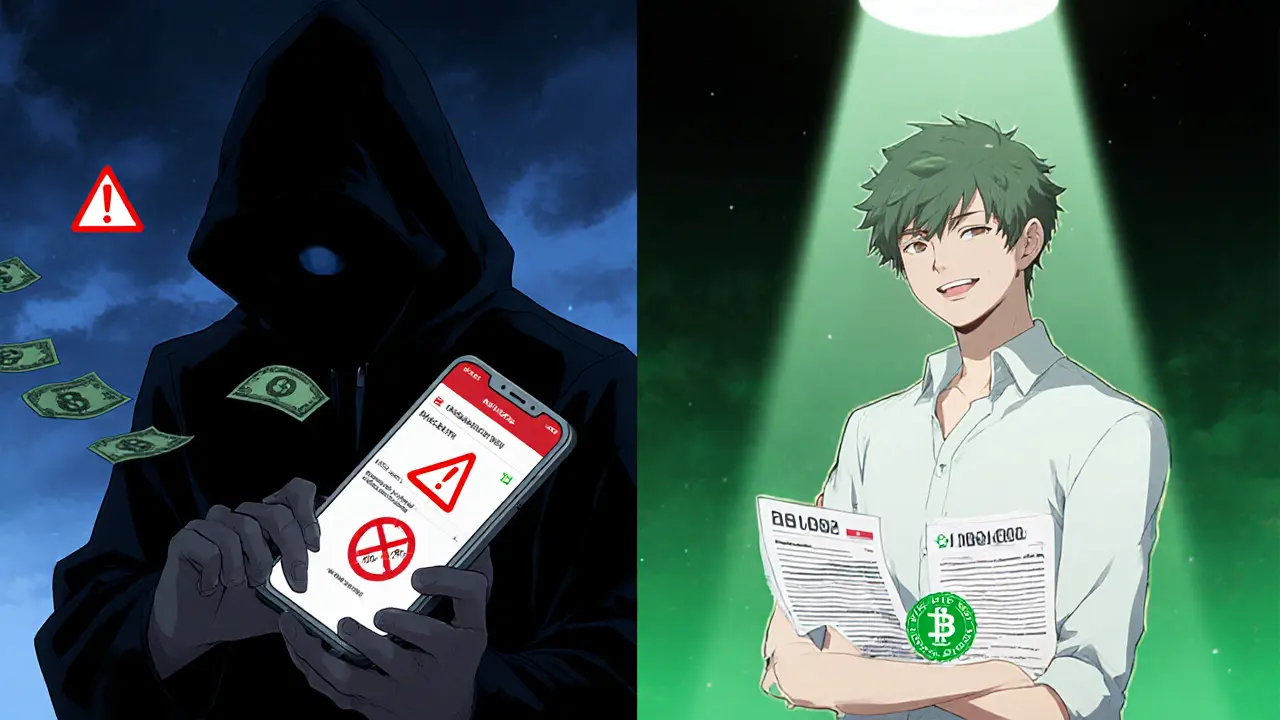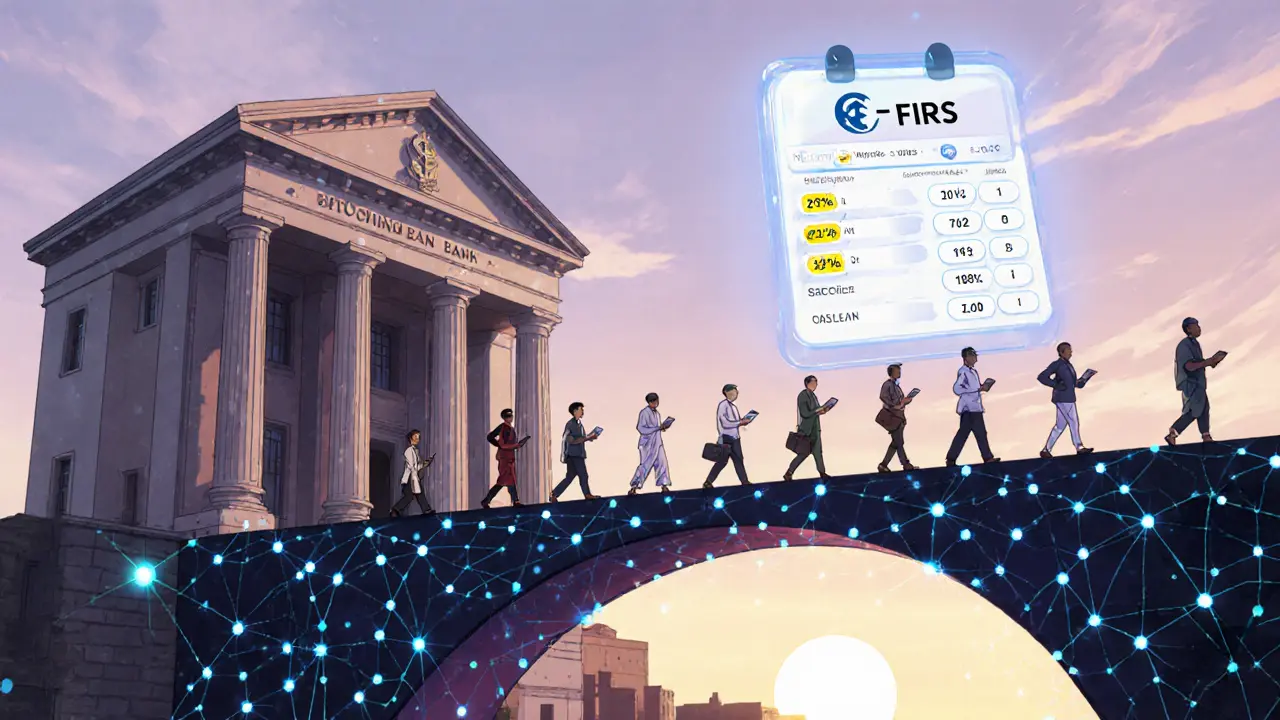SEC Crypto Exchange License Checker
Check if your preferred crypto exchange is officially licensed by Nigeria's Securities and Exchange Commission (SEC) as of October 2025. Using unlicensed platforms risks account freezes, lost funds, and legal exposure.
Five years ago, if you tried to buy Bitcoin in Nigeria, your bank account could get frozen. Banks were ordered to cut off crypto users. Exchanges shut down. People turned to peer-to-peer trading, cash deposits, and risky workarounds just to get access to digital assets. That era is over. As of March 2025, Nigeria doesn’t just allow crypto - it regulates it. The Investments and Securities Act (ISA) 2025 made digital assets legal financial securities. The Central Bank of Nigeria lifted its ban on crypto transactions in late 2023. And now, the Securities and Exchange Commission (SEC) is licensing exchanges like Quidax and Busha.
So why are people still asking how to avoid crypto restrictions? Because the rules changed - and many don’t know how to play by them. You don’t need to bypass the system anymore. You need to join it. The real challenge isn’t avoiding restrictions - it’s understanding the new ones so you don’t get caught breaking them.
There Are No More Bans - Just Rules
The biggest myth about crypto in Nigeria today is that it’s still illegal or restricted. It’s not. The Central Bank of Nigeria (CBN) no longer blocks crypto transactions. Banks can now open accounts for licensed crypto businesses. If you’re using a platform like Quidax or Busha - both fully registered with the SEC - you’re operating legally. Your money moves through the banking system. Your ID is verified. Your transactions are recorded.
What changed? Before 2025, crypto existed in a gray zone. Now, it’s in black and white. The SEC is the regulator. You need to use a licensed Virtual Asset Service Provider (VASP). If you’re trading on an unlicensed app or peer-to-peer site that doesn’t comply with KYC, you’re still in a risky space - not because crypto is banned, but because you’re dealing with unregulated actors.
There’s no need to hide your crypto activity. But you do need to use the right tools. The goal isn’t to avoid restrictions - it’s to work inside the system.
Use Only SEC-Licensed Exchanges
If you want to buy, sell, or trade crypto in Nigeria in 2025, your first step is simple: use only exchanges approved by the SEC. As of October 2025, only a handful have been licensed, including:
- Quidax
- Busha
- Yellow Card (licensed in Q2 2025)
- NairaEx (recently cleared after compliance overhaul)
These platforms require full identity verification - your National ID, proof of address, and selfie. That’s not a restriction. It’s protection. It keeps your funds safe and ensures you’re not accidentally funding fraud.
Unlicensed apps? They’re still around. Some promise faster sign-ups, no ID checks, or lower fees. But if your money disappears, you have no recourse. The SEC can’t help you. The police can’t help you. And your bank won’t reverse the transaction because you used an illegal service.
Stick to the licensed ones. They’re slower to sign up. They’re more expensive. But they’re legal. And in Nigeria’s new crypto world, legal is safer.
Banking Is Now Open - Use It
Remember when you had to send cash to a stranger’s account to buy Bitcoin? That’s gone. Licensed exchanges now have direct bank integrations with major Nigerian banks like GTBank, Access Bank, and Zenith. You can deposit Naira directly from your account. Withdraw profits back to your bank. It’s fast, traceable, and fully compliant.
Some users still avoid bank links because they fear account freezes. That fear is outdated. The CBN explicitly permits licensed VASPs to operate with banking services. If your bank blocks a deposit from Quidax, call them. Show them the SEC’s public list of approved exchanges. Most banks have updated their internal policies.
Don’t use third-party payment processors or P2P platforms that require you to send money to random individuals. That’s how scams happen. Use direct bank transfers through licensed exchanges. It’s the easiest, safest way to move money in and out of crypto.

Taxes Are Coming - Get Ready
Starting January 1, 2026, crypto profits in Nigeria will be taxed. The Nigerian Tax Administration Act 2025 treats digital assets as property. That means:
- If you sell Bitcoin for a profit, you pay personal income tax - up to 25% depending on your total earnings.
- If you run a crypto business, you pay 20-30% corporate tax.
- All transaction fees charged by exchanges are subject to 7.5% VAT.
There’s no way around this. The tax system is being built to track crypto. The SEC will share transaction data with the Federal Inland Revenue Service (FIRS). If you’re trading on a licensed exchange, your activity is already recorded. Hiding it won’t work.
Instead of avoiding taxes, plan for them. Keep records of every buy and sell. Use apps like Koinly or CoinTracker to track your cost basis. Don’t wait until tax season to figure it out. Start now.
Many Nigerians are afraid of taxes. But in a regulated system, paying taxes isn’t a penalty - it’s proof you’re playing by the rules. And that gives you legal protection.
What About Privacy? You Can’t Have Both
One of the biggest appeals of crypto used to be anonymity. You could trade without giving your name. No one knew who you were. That’s over. Nigeria’s new rules require full KYC. You must show ID. Your transactions are logged. Your bank knows you’re trading crypto.
If you want privacy, you can’t use Nigerian exchanges. But if you want safety, legality, and access to your money - you must give up anonymity. The trade-off is real. And for most people, it’s worth it.
Trying to use offshore platforms to hide your identity is risky. You’ll still need to send Naira to buy crypto. That leaves a trail. And if the SEC finds out you’re using an unlicensed service to evade KYC, you could face penalties - even if you didn’t break any laws intentionally.
Privacy isn’t dead. But in Nigeria’s new system, it’s not free. It’s a luxury you pay for - and most people don’t need it.
DeFi and Stablecoins? Still Gray
Right now, the SEC’s rules cover exchanges and investment tokens. But what about decentralized finance (DeFi) platforms like Uniswap or Aave? What about stablecoins like USDT or USDC? The law doesn’t say yet.
That means you can still use them - but you’re in a legal gray zone. If you’re swapping USDT for ETH on a decentralized app, you’re not breaking the law. But you’re not protected by it either. If something goes wrong - a hack, a scam, a frozen wallet - there’s no regulator to call.
For now, stick to licensed exchanges for buying and selling. Use DeFi only for small, experimental amounts. Don’t lock up life savings in an unregulated protocol. The rules will catch up. When they do, you’ll want to be on the right side.

What Happens If You Break the Rules?
Penalties for using unlicensed platforms aren’t fines - they’re legal exposure. The Economic and Financial Crimes Commission (EFCC) and NFIU now have access to telecom data and bank records. If you’re flagged for suspicious crypto activity, they can trace it back to you.
You won’t go to jail for buying Bitcoin. But if you’re involved in money laundering, fraud, or running an unlicensed exchange - you’re in serious trouble. The SEC has new tools. They’re watching. And they’re not afraid to act.
The best way to avoid trouble? Don’t break the rules. Play by them. Use licensed platforms. Report your taxes. Keep records. That’s not avoiding restrictions - that’s mastering them.
Next Steps: How to Start Legally
If you want to trade crypto in Nigeria in 2025, here’s your exact roadmap:
- Go to the SEC’s official website and download the list of licensed VASPs.
- Choose one exchange - Quidax or Busha are the most established.
- Complete full KYC: upload your ID, proof of address, and take a live selfie.
- Link your Nigerian bank account directly to the exchange.
- Buy your first crypto using Naira. Start small.
- Use a crypto tax tracker to log every transaction.
- Never use unlicensed apps or P2P sellers with no ID verification.
That’s it. No VPNs. No offshore wallets. No hidden tricks. Just a simple, legal path.
Why This Matters Beyond Crypto
Nigeria’s shift isn’t just about Bitcoin. It’s about financial freedom. For years, people used crypto because banks wouldn’t serve them. Now, banks are being forced to serve them - legally. The SEC’s framework is designed to bring millions of unbanked Nigerians into the formal economy. Crypto is the bridge.
If you’re using crypto to send money to family abroad, save against inflation, or start a small business - you’re not circumventing the system. You’re helping build a better one.
The old days of hiding, dodging, and bypassing are over. The new era is about using crypto the right way. And that’s not a restriction. It’s an opportunity.

Clarice Coelho Marlière Arruda
October 31, 2025 AT 01:07so like... you just gotta use the licensed apps now? no more sneaky p2p? kinda wild how fast this changed.
Brian Collett
October 31, 2025 AT 15:47Wait so if I used Busha last week and my bank didn’t flag me, that means I was already legal? I thought I was dodging bullets. 😅
Allison Andrews
November 1, 2025 AT 14:05The shift from underground workaround to regulated asset class is more profound than most realize. It’s not about compliance-it’s about institutional recognition of decentralized value. The state is no longer fighting the technology; it’s co-opting it.
Wayne Overton
November 1, 2025 AT 23:25taxes are coming bro stop lying
Alisa Rosner
November 2, 2025 AT 22:17YESSSS! 🙌 Use Quidax or Busha-no cap! KYC is annoying but it keeps your money safe. And yes, link your bank! No more sending cash to strangers!! 💸✅
MICHELLE SANTOYO
November 4, 2025 AT 11:10Oh so now the government gets to decide what 'legal' crypto looks like? Next they'll be telling us which blockchain we can use. Welcome to the new feudalism.
Lena Novikova
November 5, 2025 AT 01:56you think the SEC gives a damn about you? they just want to tax you and control the flow. you're not playing by the rules-you're being herded
Olav Hans-Ols
November 6, 2025 AT 08:46This is actually kind of beautiful. Nigeria’s moving from crypto chaos to crypto clarity. No more fear. Just steps. Do the steps. You got this.
Kevin Johnston
November 7, 2025 AT 13:28LEGIT! 🚀 Use the licensed ones. Tax prep apps too. You’re not just trading-you’re building wealth the right way. 💪
Dr. Monica Ellis-Blied
November 8, 2025 AT 23:07It is imperative to note, with the utmost seriousness, that the regulatory framework established by the SEC is not merely procedural-it is foundational to financial sovereignty. Failure to adhere to KYC protocols constitutes a breach of fiduciary responsibility to one’s own economic future.
Herbert Ruiz
November 9, 2025 AT 08:32Why are people still asking this? It's in the post. Read.
Saurav Deshpande
November 10, 2025 AT 13:44licensed? yeah right. the CBN and SEC are just fronts for the IMF. they're tracking every wallet to prepare for CBDC. this is the first step to cashless slavery.
Paul Lyman
November 12, 2025 AT 12:41Bro if you're still using unlicensed apps you're asking for trouble. Link your bank. Do KYC. Use Koinly. It's not hard. I did it last month and my wallet's safe as hell now.
Frech Patz
November 12, 2025 AT 13:27Is there any published data on the volume of transactions processed through licensed VASPs versus unlicensed platforms since Q4 2024? The efficacy of regulation hinges on measurable adoption metrics.
Derajanique Mckinney
November 13, 2025 AT 04:14why do they need so much id?? i just wanna buy doge 😭
Rosanna Gulisano
November 13, 2025 AT 15:31you're just a pawn now
Sheetal Tolambe
November 13, 2025 AT 16:00I started using Quidax last month and it felt so good to not be scared anymore. My cousin in Lagos said the same thing. We’re finally part of the system, not fighting it.
gurmukh bhambra
November 13, 2025 AT 16:13you think the government cares about your safety? they want to know who you send money to. they're watching. every coin. every transfer. they'll come for you next.
Sunny Kashyap
November 14, 2025 AT 14:45why are we letting foreigners tell us how to do crypto? we had p2p working fine. now we're begging for permission.
james mason
November 16, 2025 AT 13:40Oh, so now we’re supposed to be grateful for being allowed to participate in a system that was built to exclude us? How quaint. I’ll stick with my offshore DeFi, thanks.
Anna Mitchell
November 18, 2025 AT 06:16It’s refreshing to see a clear path instead of chaos. I was scared to even look at crypto in Nigeria. Now I feel like I can actually start.
Pranav Shimpi
November 20, 2025 AT 03:30if you use busha or quidax you must keep records of every tx even if its 500 naira. FIRS will audit. i lost 300k last year because i didnt track my small sells. dont be me
jummy santh
November 20, 2025 AT 19:11As a Nigerian, I can say with certainty that this is a watershed moment. The transition from underground economy to formalized financial participation is not merely regulatory-it is cultural. We are reclaiming agency through compliance, not defiance.
Kirsten McCallum
November 21, 2025 AT 11:11you traded your freedom for convenience
Nick Cooney
November 23, 2025 AT 08:15So let me get this straight… we went from ‘crypto is illegal’ to ‘here’s your tax form and ID scanner’ in two years? That’s not progress. That’s corporate onboarding with a side of surveillance. I miss the days when you just sent cash to a guy with a phone and a smile.
And don’t get me started on ‘legal is safer.’ Legal means traceable. Traceable means targetable. The SEC doesn’t care if you lose money-they care if you pay taxes. The banks? They’ll freeze you if you make too many deposits. So now we’re just paying for the privilege of being monitored?
I used Quidax last month. Took three days to verify. They asked for my utility bill, my national ID, a selfie with a handwritten note, and my mother’s maiden name. I didn’t even know they had that info. I felt like I was applying for a bank loan in 1998.
And now they’re saying ‘use only licensed exchanges’ like it’s a recommendation. It’s a mandate. And if I don’t? My bank might flag me. My phone might get tapped. My neighbor might report me because ‘someone said crypto is suspicious.’
They call it ‘protection.’ I call it control dressed in compliance. The people who built this system didn’t want to make crypto safe-they wanted to make it predictable. And predictable means profitable-for them.
So yeah, I’ll use Busha. I’ll file my taxes. I’ll keep my records. But I’m not naive enough to think I’m playing by the rules. I’m playing their game. And the rules? They change every quarter.
And if you’re still using P2P? You’re not reckless. You’re wise. You know the system isn’t here to protect you. It’s here to extract. And you’re still finding ways to keep your money yours.
Brian Collett
November 25, 2025 AT 00:20Bro I literally just got flagged by GTBank for a Quidax deposit. Called them and they said ‘oh yeah we got the list from SEC last week’ and unblocked it. So yeah, banks are finally catching up. Don’t panic.
Paul Lyman
November 26, 2025 AT 19:13you’re right about the ID thing but trust me it’s worth it. i got hacked on an unlicensed app last year and lost 200k. now i use quidax and i sleep like a baby. no stress